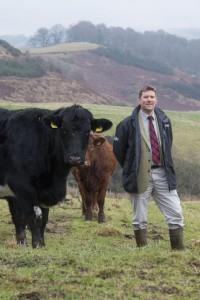Improving the utilisation of grass to increase the kilogrammes of meat produced per hectare is the main objective of a major new grassland project announced by Quality Meat Scotland (QMS) today (April 14th 2014).

The new initiative will see five grazing groups established throughout Scotland - in the South-West, Borders, Central, Aberdeenshire and northern Scotland.
The groups will be hosted by farmers who are keen to make more of their grazing and will have around 20 members who will attend four group meetings each year. The meetings will involve a range of expert speakers and will focus on the host’s previous performance data as well as monitoring growth rates of their stock to target maximum uplift in performance from grazing.
“There is huge potential for efficiencies in red meat production by refining our grassland management,” said Johnny Mackey, QMS head of industry development. “Currently only 50-60% of the grass we grow ends up in the rumen.
“Grassland can be a major asset to all sheep and cattle producers and by bringing together groups of enthusiastic, positive farmers, we will have a fantastic opportunity to look at better grass utilisation through improved grazing management which will, in turn, impact positively on the bottom line.”
The project will also see the establishment of a network of new grass measurement stations set up on a range of farm types located around the country. Each station will provide QMS with important information on grass performance, to back up the data gathered on the host farms and provide a valuable tool for the Scottish red meat industry.
A grass event, the details of which will be announced very soon, is also planned for 30th May and will take place in central Scotland.
This event will offer attendees the opportunity to hear from practical farmers on how they are focusing on better grazing plus expert speakers, including the world-renowned New Zealand consultant Trevor Cook, giving the latest advice on optimising animal performance from pasture.
This story was originally published on a previous version of the Meat Management website and so there may be some missing images and formatting issues.












